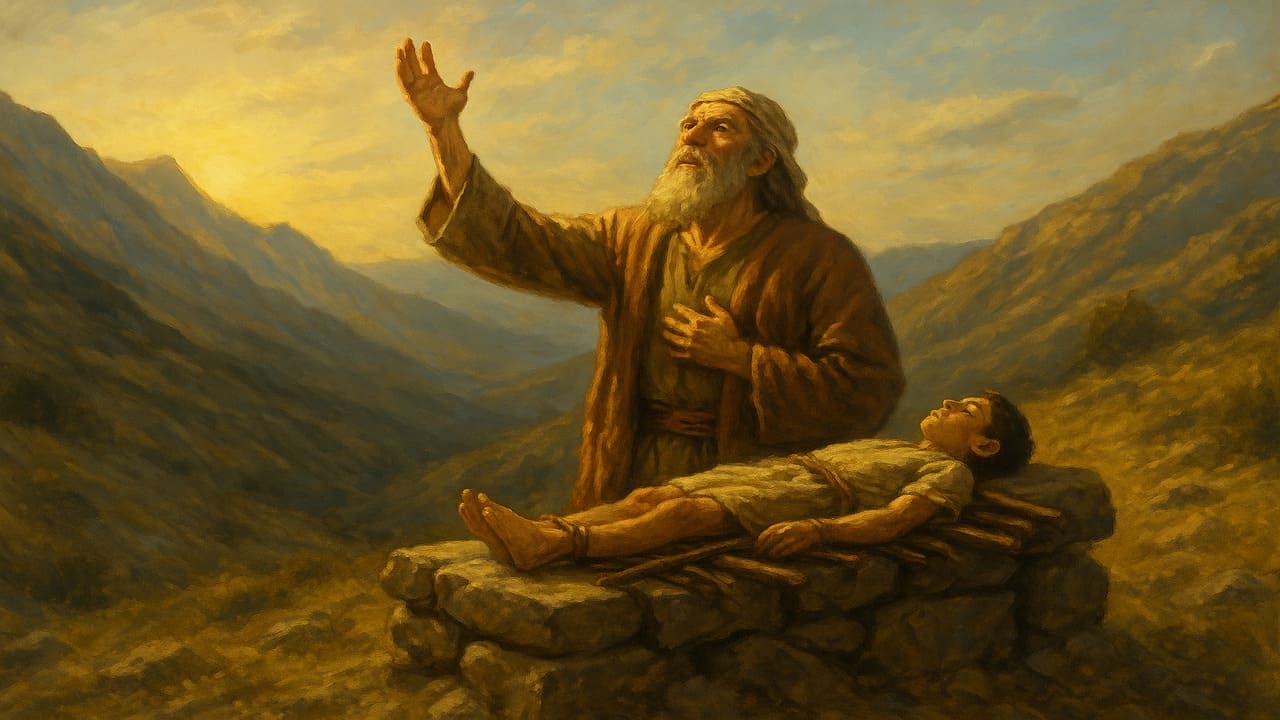
Thorn Ville Church – The wind was still. The sky, perhaps unusually silent. The sun climbing slowly over the eastern ridge cast long shadows on the face of the mountain. And there stood an old man his hand trembling, his heart steady, his eyes lifted toward heaven. In that moment, knife raised in obedience, Abraham stood at the edge of human understanding and divine purpose. This was Mount Moriah, and the test before Abraham was one that still echoes across centuries of faith, fear, and surrender.
Three days earlier, Abraham had heard the unthinkable: “Take your son, your only son Isaac, whom you love, and go to the region On Mount Moriah. Sacrifice him there…” (Genesis 22:2). The command was devastating not only because it involved Isaac the miracle child he and Sarah had waited decades to receive but because it seemed to threaten the very promise God had given him.
Isaac was not just a beloved son. He was the fulfillment of a covenant, the living proof that God was building a future through Abraham’s line. And now, it appeared that same God was asking him to give it all back.
Abraham didn’t argue. He didn’t delay. He rose early, saddled the donkey, split the wood, and began walking with the weight of a knife and the weight of obedience pressing equally hard.
Also Read : Joseph the Dreamer: From Pit to Palace with Unshakable Faith
As they neared the mountain, Abraham told his servants to stay behind: “We will worship and then we will come back to you.” A curious phrase. A flicker of faith, perhaps, or a prophetic instinct beyond even Abraham’s understanding.
Then came the climb. Just father and son. Isaac, innocent and perceptive, carried the wood. Abraham carried the fire and the knife. Somewhere along the ascent, Isaac asked the question that must have pierced deeper than any blade:
“Father, the fire and wood are here, but where is the lamb for the burnt offering?”
Abraham replied, “God himself will provide the lamb.”
Was he hoping? Believing? Stalling for time? Or was it all three? Whatever his heart wrestled with, his steps didn’t falter.
At the top, Abraham built the altar. He arranged the wood. He bound Isaac who, remarkably, is never recorded as resisting. Whether out of trust or shock, Isaac allowed himself to be laid upon the altar.
Then, Abraham reached for the knife.
It’s one of Scripture’s most haunting moments: a hand raised in obedience to a God who seemed silent, yet somehow trustworthy. Abraham’s willingness was not the act of a reckless zealot it was the culmination of a faith forged through years of waiting, walking, failing, and learning.
And in that final second when air may have held its breath he heard it:
“Abraham! Abraham!”
“Here I am,” he answered.
“Do not lay a hand on the boy… Now I know that you fear God, because you have not withheld from me your son, your only son.”
Relief must have rushed in like water. And then, in the thicket, a ram caught by its horns. A substitute. A provision. Exactly as Abraham had said.
Read More : The Old Guard 2: A Dull Immortal Sequel That Fails to Rise
The story doesn’t end with the descent from Moriah. In fact, Mount Moriah becomes one of the most spiritually charged locations in biblical history. Centuries later, it would become the site where Solomon built the temple (2 Chronicles 3:1). Some traditions even suggest it lies near Calvary, where another Father gave His only Son this time with no ram to take His place.
The parallel is profound: a beloved son, wood carried on his back, laid upon an altar, and a sacrifice that would change everything. In Abraham’s story, the knife stops. In the gospel, it does not.
Abraham’s test on Moriah is not a call to repeat his actions it’s a call to understand the depth of trust that faith sometimes demands. He didn’t know how it would end. He had no blueprint. All he had was a word, a history with God, and a willingness to obey even when it tore at his heart.
What Mount Moriah teaches us isn’t just about sacrifice. It’s about posture. It asks us whether we’re willing to climb, even when the outcome is unclear. Whether we’ll trust the Provider when provision seems delayed. Whether we’ll say “Here I am” when obedience feels impossible.
Because sometimes, faith doesn’t look like certainty it looks like walking uphill with wood on your back and a promise in your heart.
Thornville Church - Your Source for Biblical Inspiration - Thousands of visitors journey each year to historic religious sites believed…
Thornville Church - Your Source for Biblical Inspiration - Long term fitness planning now determines how strong, mobile, and independent…
Thornville Church - Your Source for Biblical Inspiration - Ancient Christian pilgrimage destinations are reshaping ancient christian faith education by…
Thornville Church - Your Source for Biblical Inspiration - Romanesque churches early Europe menunjukkan bagaimana arsitektur batu massif membentuk praktik…
Thornville Church - Your Source for Biblical Inspiration - Archaeological insights book acts increasingly illuminate the historical landscape of the…
Thornville Church - Your Source for Biblical Inspiration - Archaeologists and historians are piecing together the hidden story of fifth…